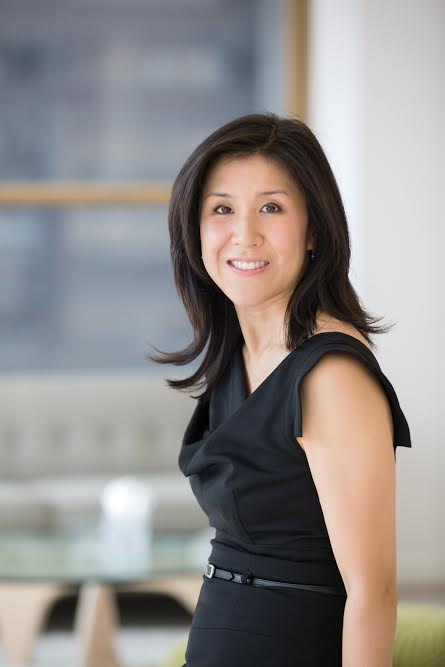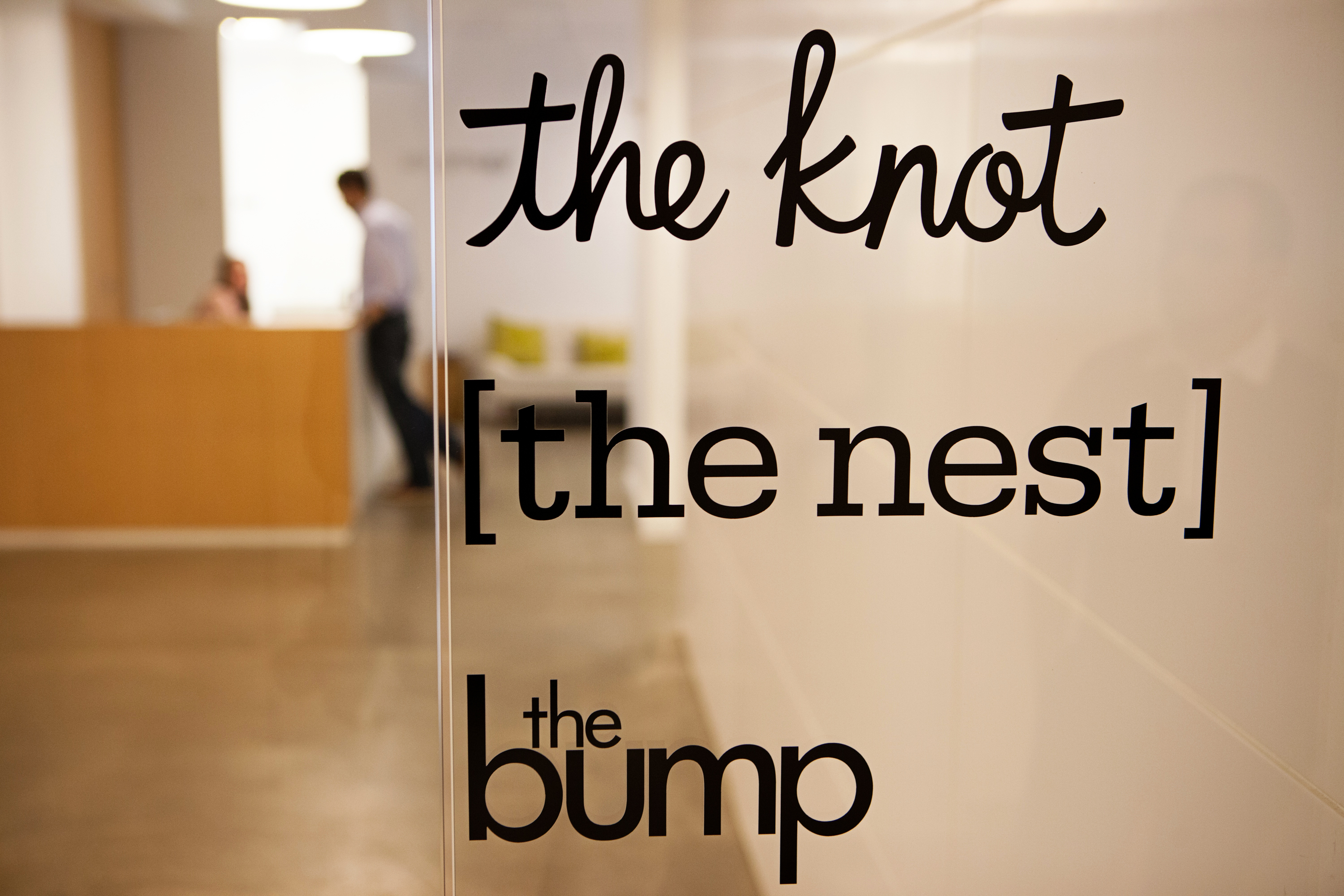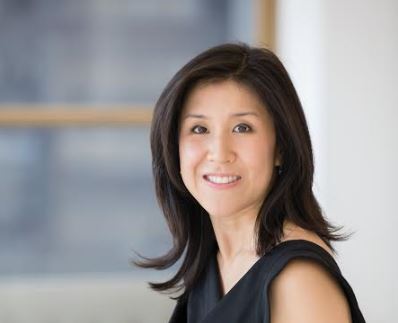Diving into uncharted territory isn’t an easy task. How do you learn to stand your ground in a new, rapidly changing  field? In this interview, business tech expert Katherine Wu Brady tells her story of taking risks, finding her strengths, and defining the type of leader she wanted to become.
field? In this interview, business tech expert Katherine Wu Brady tells her story of taking risks, finding her strengths, and defining the type of leader she wanted to become.
First off, what does your job at XO Group entail?
At XO Group, my title is EVP, Commerce and Registry, and I like to think of my role through the lens of our company mission: to help couples navigate life’s biggest moments together. Our company helps people who are planning a wedding, moving in together, and starting a family. Each of these moments is new and exciting, but also unfamiliar territory for most, so the decisions they have to make can be daunting. XO Group helps guide people through their entire fact-finding, planning and purchasing journey. Personally, I thrive when solving complicated problems and so this highly motivating. Our work helps couples make these decisions with confidence, and my team specifically focuses on helping our users with their purchasing choices.
My team and I spend much of our time working with existing business partners, including big retailers like Macy’s, Bed Bath & Beyond, and Crate & Barrel, and more niche service providers like Shutterfly, Weddingstar, and Hitchswitch, and identifying new ones to match our users’ purchasing and commerce needs. My team is responsible for managing the retail relationships that comprise our patented, single-list wedding, and baby registry program. Any registry created on The Knot or The Bump or through national retailers can be found in one list on our website, making it a one-stop shop for anyone who wants to make a gift purchase. Beyond registry, we also spend time researching what products and services our users need, and we identify and work with business partners to fulfill those needs. This could mean that we are developing new features or merchandise, or finding ways to better communicate those services to our users at the right moment and in the right way during their bridal or baby journey. It’s a lot of data, planning, external relationship management, and internal cross-functional work. Since we drive the fastest growing, yet smallest revenue stream business line, we are viewed as an incubation unit. My goal is to fail fast, learn quickly, and continually optimize what we do. It’s fun and challenging work because no initiative is the same and we are building our best practices rather than referencing ones that were set in place.
In addition to building our Commerce business, as an executive of XO, I’m responsible for supporting and thinking about opportunities across the entire company. This means that I spend time across departments to address our employees’ concerns, often on things like creating processes and systems that increase productivity and quality of our work. Our management team is very committed to not only hitting short-term goals, but also to building a company that is strong many years from now. I mentor a number of people across the company and am often involved in initiatives that are cross-functional. My background is in operations and while I’m always enthusiastic about building the commerce team, I’m equally enthusiastic about doing work outside of my team—some may say too enthusiastic. My boss often says that I suffer from never seeing a problem that I don’t want to solve. For me, it’s very simple, working outside of my domain allows me to both learn more and contribute more to the health of the company. Going that extra mile matters so much when you are asking your teams to work extra hard on solving tough problems. When they see their leaders extending themselves beyond their defined roles, that’s when they feel empowered to do the same.
 You’ve been involved with founding/launching many new companies and startups how do you identify what’s going to be the “next big thing” in such a rapidly changing landscape?
You’ve been involved with founding/launching many new companies and startups how do you identify what’s going to be the “next big thing” in such a rapidly changing landscape?
I think it is incredibly difficult to identify the “next big thing” and I don’t put pressure on myself to find that unicorn, but rather, I focus on my strengths. I am fortunate in that I’ve been able to identify talented leaders from which to learn from in each and every job I’ve had. That’s always been my litmus test for finding the right job opportunity. I’m motivated by opportunities to learn. I find that I learn the most from people smarter than me and that I learn by doing. I’ve been incredibly fortunate to be consistently given opportunities in my career to learn. While I was at NBC, I had five different roles in four and a half years. Each role came to me because the decision makers trusted my strength in solving problems despite having no experience in the sector or function.
Have you ever taken a risk that ended up not panning out the way you expected?
Failure is inherent to success, and honestly, I have had more failures than I can remember. But it’s OK to fail, as long as you learn from it. I find that the only way to power through the valleys is to remain optimistic and motivated. An example was the launch of my first mobile app. I had a team of two–myself and one product manager. We were so enthusiastic and naive, and we inadvertently launched a product that had an incredibly novel interface, but it didn’t translate to the user’s needs. In addition, this was long before mobile apps were widely used and the KPIs for success were out of line with user adoption trends. This was a valuable learning experience that set me up as an “expert” in a nascent field. I carried these learnings with me, and I parlayed them into subsequent roles in different job functions. One of my biggest lessons from this project was to validate goals and market demand much more carefully in future projects. I was also quite fortunate to have a manager who was supportive of the project regardless of the outcome–this is a crucial component when taking huge risks.
You also have a track record of working with a diverse range of companies, from online sales sites to broadcasting networks. What kinds of missions and projects are you personally drawn to?
I love opportunities where there is a deep user or business need. To date, I’ve applied my skills to projects that include making video content available in a new medium, creating social connections, supporting local communities, and most recently helping people through life’s biggest moments. Working at XO Group, I’ve come to realize that I enjoy when my work makes a difference, and I dream of tackling even more cause-related projects like education, community development, and healthcare.
Growing up, were there any particular experiences that helped you find your calling or develop skills that are vital to what you do now?
I was so fortunate to attend a public, magnet high school in northern New Jersey (the Academy for the Advancement of Science & Technology; today it’s known as the Bergen Academies). I look back now and realize that it was life-changing and life-defining for a few reasons. It was a unique experience to be part of a highly progressive, math and science-driven school that fostered an environment focused on experienced-based learning. Before entering the program I had no clue as to what direction I wanted my career to be, but by the time I left I knew I wanted to be at the intersection of business and technology. At this school, I received a great education in speaking the languages of business, science, and technology. The entrepreneurial environment helped me develop skills that became the foundation of my career. Since it was a new school, everything from the classrooms, class schedule, and the teaching methods were in transition and development, and students were invited to participate in helping define it. It was also highly team-orientated. This gave me so many opportunities to develop interpersonal skills and solve problems as a team comprised of different personalities, skills, levels of experience, and motivation. It has had a lasting impact on how I work cross-functionally and with my own teams today.
Women tend to be underrepresented in corporate leadership positions. What advice would you give to young girls who want to work in male-dominated industries?
Throughout my education, there were always far more men than women in my classes and I tended not to think about the gender gap and the glass ceiling. But by the time I was a senior business leader, it was abundantly clear that women were viewed very differently than men and held far fewer senior positions. I have seen this improve in recent years, and I believe that while it is still pervasive in businesses overall, there are more leaders and companies that have redefined the status quo. This is certainly true of Mike Steib, the CEO of XO Group (and my boss) and of the leaders we have up and down the ranks here.
In terms of advice, I’ll share something I learned at a course designed to help women leaders at a former company push through something that was holding their careers back. The concept was simple. We often look up to see what lies ahead in our career path and based on who fills those positions, we formulate if we are a fit for the same or similar roles. What the course taught you was that sometimes you can’t find a leader who you want to emulate, and that when that happens, you should not give up growing your career. Instead, take time to define the leadership attributes that matter to you most and work towards developing those skills and talents. Becoming a great leader is not about mimicking others, but rather it’s about contributing something meaningful to those around you. Sometimes, that means learning from those that you admire, but just as often, it means self-defining what impact means to you and driving towards it.
Contributor: Jasmine Don



Comments (0)